(完整)初中英语be动词用法
be的几种形式和用法
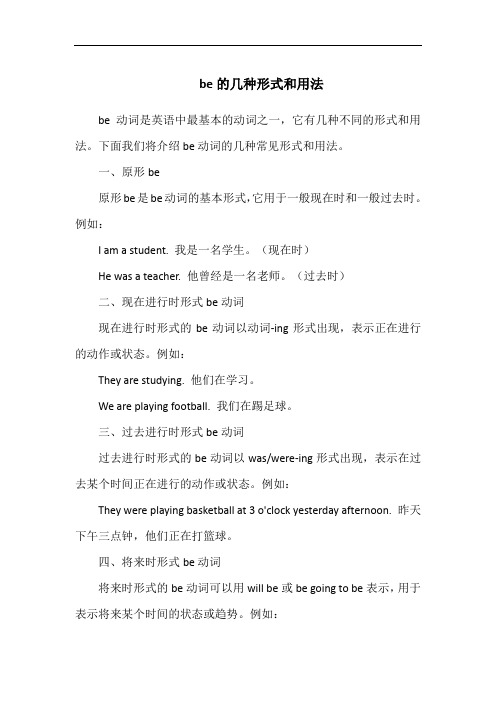
be的几种形式和用法be动词是英语中最基本的动词之一,它有几种不同的形式和用法。
下面我们将介绍be动词的几种常见形式和用法。
一、原形be原形be是be动词的基本形式,它用于一般现在时和一般过去时。
例如:I am a student. 我是一名学生。
(现在时)He was a teacher. 他曾经是一名老师。
(过去时)二、现在进行时形式be动词现在进行时形式的be动词以动词-ing形式出现,表示正在进行的动作或状态。
例如:They are studying. 他们在学习。
We are playing football. 我们在踢足球。
三、过去进行时形式be动词过去进行时形式的be动词以was/were-ing形式出现,表示在过去某个时间正在进行的动作或状态。
例如:They were playing basketball at 3 o'clock yesterday afternoon. 昨天下午三点钟,他们正在打篮球。
四、将来时形式be动词将来时形式的be动词可以用will be或be going to be表示,用于表示将来某个时间的状态或趋势。
例如:It will be sunny tomorrow. 明天将是晴天。
We are going to be late. 我们马上就要迟到了。
五、被动语态形式be动词被动语态形式的be动词用于表示主语被动作所作用,以强调动作的目标。
例如:The book was written by him. 这本书是由他写的。
(书是被动接受了写这个动作)。
初一英语be动词的用法完整版
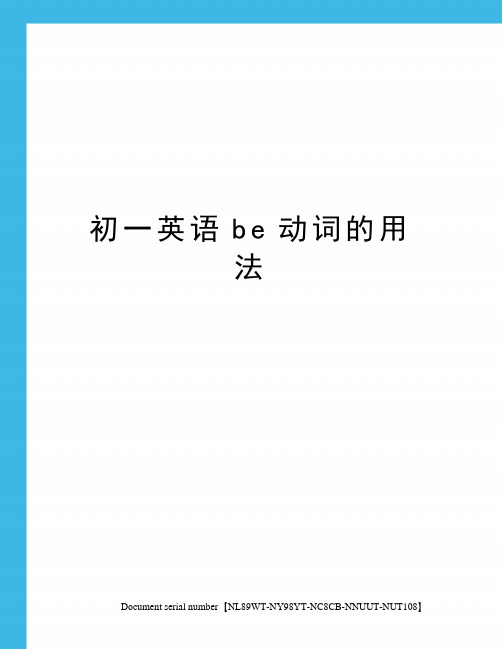
初一英语b e动词的用法Document serial number【NL89WT-NY98YT-NC8CB-NNUUT-NUT108】b e动词的用法常见的be动词形式:amisare口诀:我(I)用am,你,你们(you)用are,is跟着他(he),她(she),它(it)单数is例如:Thisisapen.Theboyisverylovely.复数are例如:Wearestudents.Theyareinthepark.ThegirlsarefromEngland.be动词的否定形式:amnot,isnot=isn’t,arenot=aren’t含有be动词的陈述句变为否定句:在be动词后面加not含有be动词的陈述句变为一般疑问句:将be动词提到句首。
例如:Heisagoodboy.Isheagoodboy?Theyareintheschool.Aretheyintheschool?Thisisabook.Isthisabook?Themanisadoctor.Isthemanadoctor.注意:Iam/weare变疑问句时要换成areyou.Iamhungry.Areyouhungry?Wearegoodfriends.Areyougoodfriends?练一练:一、在下面的短文中填上恰当be动词。
I______agirl.Myname_______Mary.I______inClass2,Grade7.I______12yearsold.Her e______myfamilyphoto.Look!These______myparentsandthose_______mygrandparents .Thisboy______mybrother.He________15yearsoldnow.That______mycat,Mimi.It____ __verylovely.二、在下面的题目中填上恰当的Be动词。
be动词的用法总结

be动词的用法总结be动词是英语中最基本且常用的动词之一,在句子中起到连接主语和表语的作用。
它的形式变化多样,包括am、is、are、was、were、be、being和been等。
在不同的句子结构和时态中,be动词的用法也有所不同。
下面将对be动词的用法进行详细总结。
首先,be动词用作不及物动词,表示存在、状态、位置等。
例如:1. She is happy.(她很快乐。
)2. They are in the park.(他们在公园里。
)3. The book is on the table.(书在桌子上。
)在这些例句中,be动词连接的是主语和表语,表示主语的状态或存在。
其次,be动词还可以用作辅助动词,构成进行时态和被动语态。
以下是be动词在进行时态中的用法:1. I am studying for the exam.(我正在为考试学习。
)2. He is playing basketball.(他在打篮球。
)3. They were eating dinner when I arrived.(当我到达时,他们正在吃晚饭。
)在进行时态中,be动词与现在分词形成动词短语,表示动作正在进行。
而在被动语态中,be动词与过去分词形成动词短语,将动作的承受者放在句子的主语位置。
例如:1. The book is written by a famous author.(这本书是由一位著名作家写的。
)2. The movie was watched by millions of people.(这部电影被数百万人观看。
)除了以上两种用法外,be动词还可以表示习惯、性格、身份等一些特定的含义。
例如:1. He is always late for work.(他上班总是迟到。
)2. My sister is a doctor.(我妹妹是一名医生。
)3. She is a kind person.(她是个善良的人。
Be动词的形式和用法
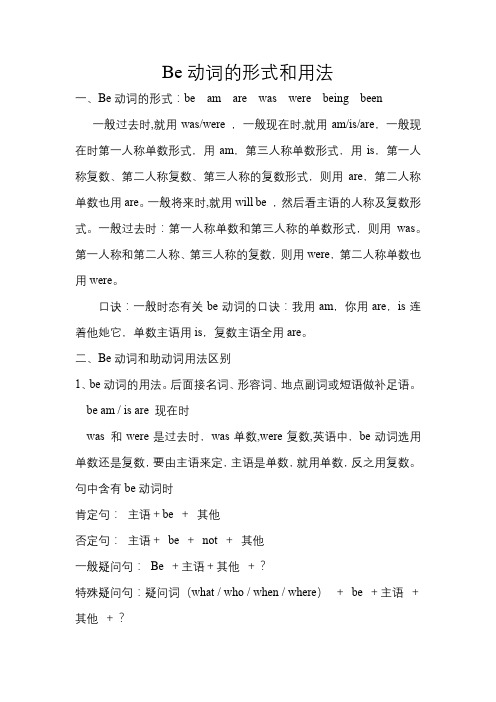
Be动词的形式和用法一、Be动词的形式:be am are was were being been一般过去时,就用was/were ,一般现在时,就用am/is/are,一般现在时第一人称单数形式,用am,第三人称单数形式,用is,第一人称复数、第二人称复数、第三人称的复数形式,则用are,第二人称单数也用are。
一般将来时,就用will be ,然后看主语的人称及复数形式。
一般过去时:第一人称单数和第三人称的单数形式,则用was。
第一人称和第二人称、第三人称的复数,则用were,第二人称单数也用were。
口诀:一般时态有关be动词的口诀:我用am,你用are,is连着他她它,单数主语用is,复数主语全用are。
二、Be动词和助动词用法区别1、be动词的用法。
后面接名词、形容词、地点副词或短语做补足语。
be am / is are 现在时was 和were是过去时,was单数,were复数,英语中,be动词选用单数还是复数,要由主语来定,主语是单数,就用单数,反之用复数。
句中含有be动词时肯定句:主语+be +其他否定句:主语+be +not +其他一般疑问句:Be +主语+其他+?特殊疑问句:疑问词(what / who / when / where)+be +主语+其他+?如:I am a teacher.You are right.She is 16 years old.My father is at home.The students are playing games.My teacher was ill yesterday.There is a picture on the wall.There are two books on the table.be动词用法歌:我用am,你用are,is 连接他她它。
单数名词用is,复数名词全用are。
变疑问,往前提,句末问号莫丢弃;变否定,更容易,be后not莫忘记;疑问否定任你变,句首大写莫迟疑。
be动词与情态动词的用法
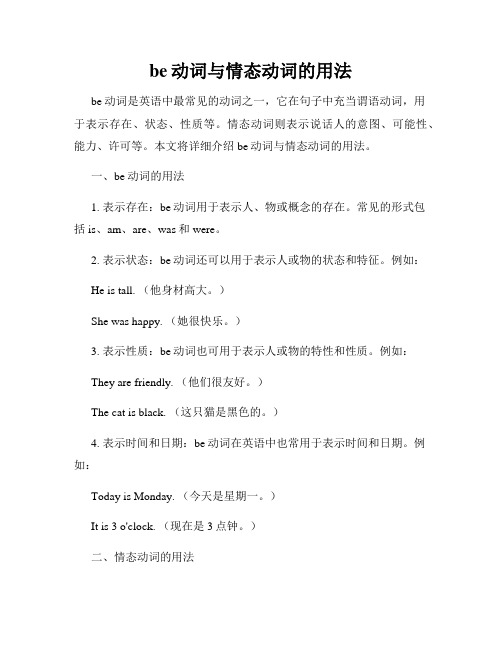
be动词与情态动词的用法be动词是英语中最常见的动词之一,它在句子中充当谓语动词,用于表示存在、状态、性质等。
情态动词则表示说话人的意图、可能性、能力、许可等。
本文将详细介绍be动词与情态动词的用法。
一、be动词的用法1. 表示存在:be动词用于表示人、物或概念的存在。
常见的形式包括is、am、are、was和were。
2. 表示状态:be动词还可以用于表示人或物的状态和特征。
例如:He is tall. (他身材高大。
)She was happy. (她很快乐。
)3. 表示性质:be动词也可用于表示人或物的特性和性质。
例如:They are friendly. (他们很友好。
)The cat is black. (这只猫是黑色的。
)4. 表示时间和日期:be动词在英语中也常用于表示时间和日期。
例如:Today is Monday. (今天是星期一。
)It is 3 o'clock. (现在是3点钟。
)二、情态动词的用法情态动词常用于表示说话人的意图、可能性、能力、许可等。
常见的情态动词包括can、could、may、might、shall、should、will、would、must、ought to等。
1. 表示能力:can和could用于表示某种能力或技能。
例如:I can swim. (我会游泳。
)He could play the piano. (他会弹钢琴。
)2. 表示可能性:may、might和could用于表示某种可能性或推测。
例如:It may rain tomorrow. (明天可能会下雨。
)He might be busy. (他可能很忙。
)3. 表示许可和建议:may、can和could有时用于表示许可或建议。
例如:May I have a piece of cake? (我可以吃一块蛋糕吗?)Can you help me with my homework? (你可以帮我做作业吗?)4. 表示义务和推荐:should和ought to用于表示某种义务或建议。
初一英语be动词的用法
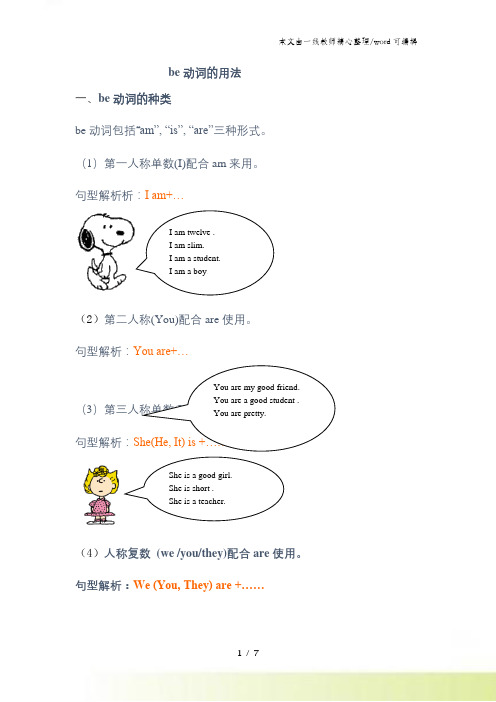
be 动词的用法一、be 动词的种类be 动词包括“am”, “is”, “are”三种形式。
(1)第一人称单数(I)配合am 来用。
句型解析析:I am+…(2)第二人称(You)配合are 使用。
句型解析:You are+…(3)第三人称单数(He or She or It)配合is 使用。
句型解析:She(He, It) is +……(4)人称复数 (we /you/they)配合are 使用。
句型解析:We (You, They) are +……I am twelve .I am slim.I am a student.I am a boy . You are my good friend.You are a good student . You are pretty. She is a good girl.She is short .She is a teacher.We are in Class 1,Grade 7.They are my friends.You are good students.综合解析当使用be动词的时候,前面请先加上第几人称。
be动词前面的人称,是不可随意替换的。
例如:I am, You are, She is,并不会出现I is, You am, She are 这样的情形。
Be的用法口诀I用am;you, we ,they 都用are,is连着he,she,it;单数名词用is,复数名词全用are。
变疑问,往前提,句末问号莫丢弃。
变否定,更容易,be后not莫忘记。
疑问否定任你变,句首大写莫迟疑。
be动词练习题1.My mother __________ a teacher.2.Your sister _________ ten years old.3.His students _________ all in the classroom.4.You and I _______ good friends.5.I _______ from Guangdong.6.Lucy _____ an English girl.7.She _____ in Class Two this year.8.You _____ our Chinese teacher this term.用be动词的适当形式填空1. Amy ____ her sister.2. His name _____ Kate.3. --What ____ your phone number?--It _____284-2942.4. -- ______ you Cara?-- No, I _____ Gina.5. Her brother’s name _____ John.6. His family name _____ Li.be动词变疑问句和否定句Be的用法口诀I用am;you, we ,they 都用are, is连着he,she,it;单数名词用is,复数名词全用are。
be动词使用方法

be动词使用方法
be动词是英语中常用的动词之一,它通常用于表示主语的状态或特征,而不是动作。
以下是be动词的使用方法:
1. be动词的基本形式是“am”、“is”、“are”。
其中,“am”用于第一人称单数(I),“is”用于第三人称单数(he、she、it),“are”用于第二人称单数和所有复数(you、we、they)。
2. be动词可以与形容词、名词、介词短语等构成谓语,表示主语的状态或特征。
例如,“I am happy”(我很高兴)、“She is a teacher”(她是一位老师)、“They are in the park”(他们在公园里)。
3. be动词可以与情态动词连用,表示猜测、可能或必要性。
例如,“It may be raining”(可能正在下雨)、“You should be careful”(你应该小心)。
4. be动词可以用于被动语态,表示被动动作。
例如,“The book is written by him”(这本书是由他写的)。
5. be动词可以用于虚拟语气,表示假设条件。
例如,“If I were you, I would go to the party”(如果我是你,我会去参加派对)。
需要注意的是,be动词不能单独使用,必须与其他词语一起构成完整的句子。
同时,be动词的用法也需要注意时态和人称的变化。
be动词用法说明
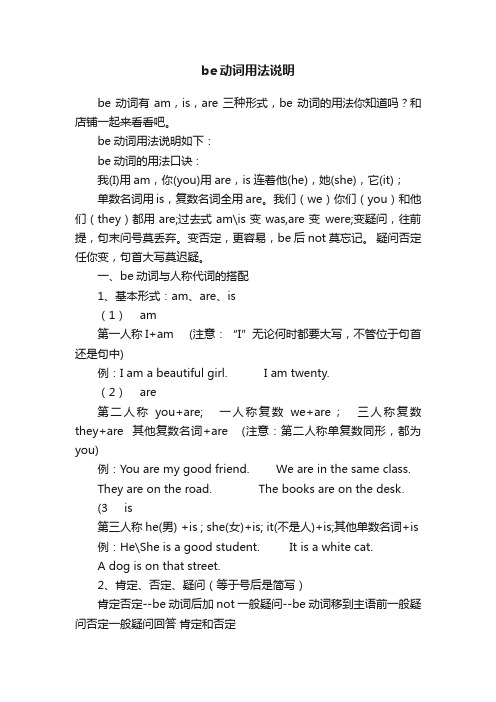
be动词用法说明be动词有am,is,are三种形式,be动词的用法你知道吗?和店铺一起来看看吧。
be动词用法说明如下:be动词的用法口诀 :我(I)用am,你(you)用are,is连着他(he),她(she),它(it);单数名词用is,复数名词全用are。
我们(we)你们(you)和他们(they)都用are;过去式am\is变was,are变were;变疑问,往前提,句末问号莫丢弃。
变否定,更容易,be后not莫忘记。
疑问否定任你变,句首大写莫迟疑。
一、be动词与人称代词的搭配1、基本形式:am、are、is(1) am第一人称I+am (注意:“I”无论何时都要大写,不管位于句首还是句中)例:I am a beautiful girl. I am twenty.(2) are第二人称you+are; 一人称复数we+are;三人称复数they+are 其他复数名词+are (注意:第二人称单复数同形,都为you)例:You are my good friend. We are in the same class.They are on the road. The books are on the desk.(3 is第三人称he(男) +is ; she(女)+is; it(不是人)+is;其他单数名词+is 例:He\She is a good student. It is a white cat.A dog is on that street.2、肯定、否定、疑问(等于号后是简写)肯定否定--be动词后加not一般疑问--be动词移到主语前一般疑问否定一般疑问回答肯定和否定I am… =I’m ….I am not…=I’m not ...Am I…?Am not I…?Yes,I’m. No,I’m not.You are…= you’re…You are not…=You aren’t…Are you…?Are not you. ..? =Aren’t you…?Yes,you are. No,you are not.She\He\It is…=She\He\It is not… =She\He\It isn’t…Is she\he\it…?Is not she\he\it…? =Isn’t she\he\it…?Yes,she\he\It is. No,she\he\It is not.We are=We’reWe are not…=We aren’t…Are we…?Are not we…? =Aren’t we…?Yes,we are. No,we are not.Th ey are=They’reThey are not…=They aren’tAre they…?Are not they…? =Aren’t they…?Yes,they are. No,they are not.例:I am(not) from London.My eyes are(not) small.My hair is(not) long.Am I a Chniese? 回答:肯定:Yes, you are. 否定:No, you aren’t.Is the cat fat? 回答:肯定:Yes, it is. 否定:No, it isn’t.注意:在一般疑问回答中,肯定回答除I’m不可简写,否定回答均可简写。
- 1、下载文档前请自行甄别文档内容的完整性,平台不提供额外的编辑、内容补充、找答案等附加服务。
- 2、"仅部分预览"的文档,不可在线预览部分如存在完整性等问题,可反馈申请退款(可完整预览的文档不适用该条件!)。
- 3、如文档侵犯您的权益,请联系客服反馈,我们会尽快为您处理(人工客服工作时间:9:00-18:30)。
be动词用法
be动词的一般现在时有三种形式,即:am,is,are。
1.如果主语是第一人称I(我)时,be动词用am。
如:I am a student.我是一名学生。
I am还可缩写成I'm。
如:I'm David.我是大卫。
2.如果主语是you(你,你们),they(他们,它们,她们)或名词复数(两个以上的人或物)时,be动词必须用are。
如:Are you twelve?你是十二岁吗?
Tom and Lily are good friends.汤姆和莉莉是好朋友。
They are at school. 他们在学校。
These are books. 这些是书。
We are students . 我们是学生。
are与主语还可缩写。
如:We are=We're,They are=They're,You are=You 're。
而are与not可缩写成aren't。
如:They aren't students.他们不是学生。
但是am与not不能缩写。
3.如果主语是单数名词、不可数名词或单数第三人称代词(he,she,it)时,be动词用is.
如:My mother is a teacher.我的妈妈是一名老师。
He is a student.他是一名学生。
She is my friend.她是我的朋友。
It is a dog. 它是一只狗。
This is a bike .这是一辆自行车。
That is a cup . 那是一个杯子。
is也可与主语缩写,
如:He is=He's,My mother is=My mother's等。
但是This is不可缩写。
而is与not可缩写成isn't。
如:This isn't a book.这不是一本书。
[解题过程]
根据以上叙述我们可以把动词的用法以口诀的形式表述出来:
我(I)是am,
你(you)是are,
剩下is留给她(she),他(he),它(it),
两个以上都用are。
be动词用法歌
be动词真伟大,生出is, am, are。
我用am,你用are,is连接他,她,它。
单数名词用is,复数名词全用are。
变疑问,往前提,句末问号莫丢弃。
变否定,更容易,be后not莫忘记。
疑问否定任你变,句首大写莫迟疑。
1 用动词be (am,are,is)填空
•I _____ a student.
•L ucy and Lily ____ from USA.
•---Who ___ they?
•--- They ____ Jim, Mike and John.
•T he white shirts _____ on the chair.
•T heir bikes ____ under a big tree.
•H is father ___ at home.
•H ow old _____ you?
•______ there any birds in the tree?
2 选择填空
---What class ___ you in? --- I_____ in Class One.
A are;are
B are;am
C are; is
They ____ new students. We ____ not new.
A are ; are
B are; am
C are ; is
---Where ____ his pencils? --- Oh, in his bag.
A is
B are
C am
Miss Gao _____ our teacher. She ____ tall.
A are; are
B are; is
C is; is
Their classroom ______ over there.
A are
B is
C am
I think Ann and Betty _____ in the classroom.
A is
B am
C are
Be动词的用法及介绍
“Be”动词的意思是”是”,它随人称的变化而变化.
1.be动词属于系动词, 在句子中主要表现为三种形式:
am is、are。
后面往往接形容词或名词做表语。
如:
(1)I’m young. (young形容词做表语)
(2)He is a boy.( a boy名词做表语)
含有be动词的句子在进行否定、疑问句变化时,都要在be 动词上变化。
(1)变为否定句:主语+be+ not+其他。
即,直接在be后not.
①I’m a Chinese boy.(变为否定句)
②You are good. (变为否定句)
③He is strict with us. (变为否定句)
④She is from America. (变为否定句)
以上四个句子中都含有am、is或are,变否定句时,直接在am 、is、are后面加上not.即:
①I’m not a Chinese boy.
②You are not good.
③He is not strict with us.
④She is not from America.
(2)变为一般疑问句:Be+主语+其他?即把be动词提到主语的前面。
注意:当肯定句主语为第一人称I和We时,变一般疑问句要变为第二人称,be动词也要相应的变为are.同样肯定句中的my和our 也要变为your.
①I am a boy. (变为一般疑问句)
→Are you a student?
②We are good friends. (变为一般疑问句)
→Are you good friends?
③She is from America. (变为一般疑问句)
→Is she from America?
④He is strict with us. (变为一般疑问句)
→Is he strict with us?
(3)变特殊疑问句:一般的要求为“对划线部分提问”,即用特殊疑问词代替划线的部分,后接省略划线部分的一般疑问句(一般不再出现划线部分)。
如:
①I’m well.(对划线部分提问)
→How are you?
②She is from America. (对划线部分提问)
→Where is she from?。
